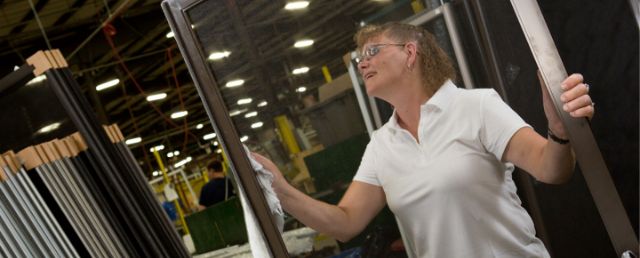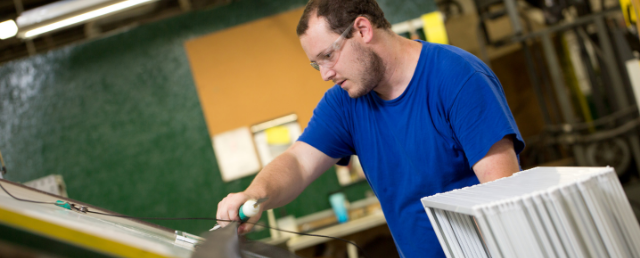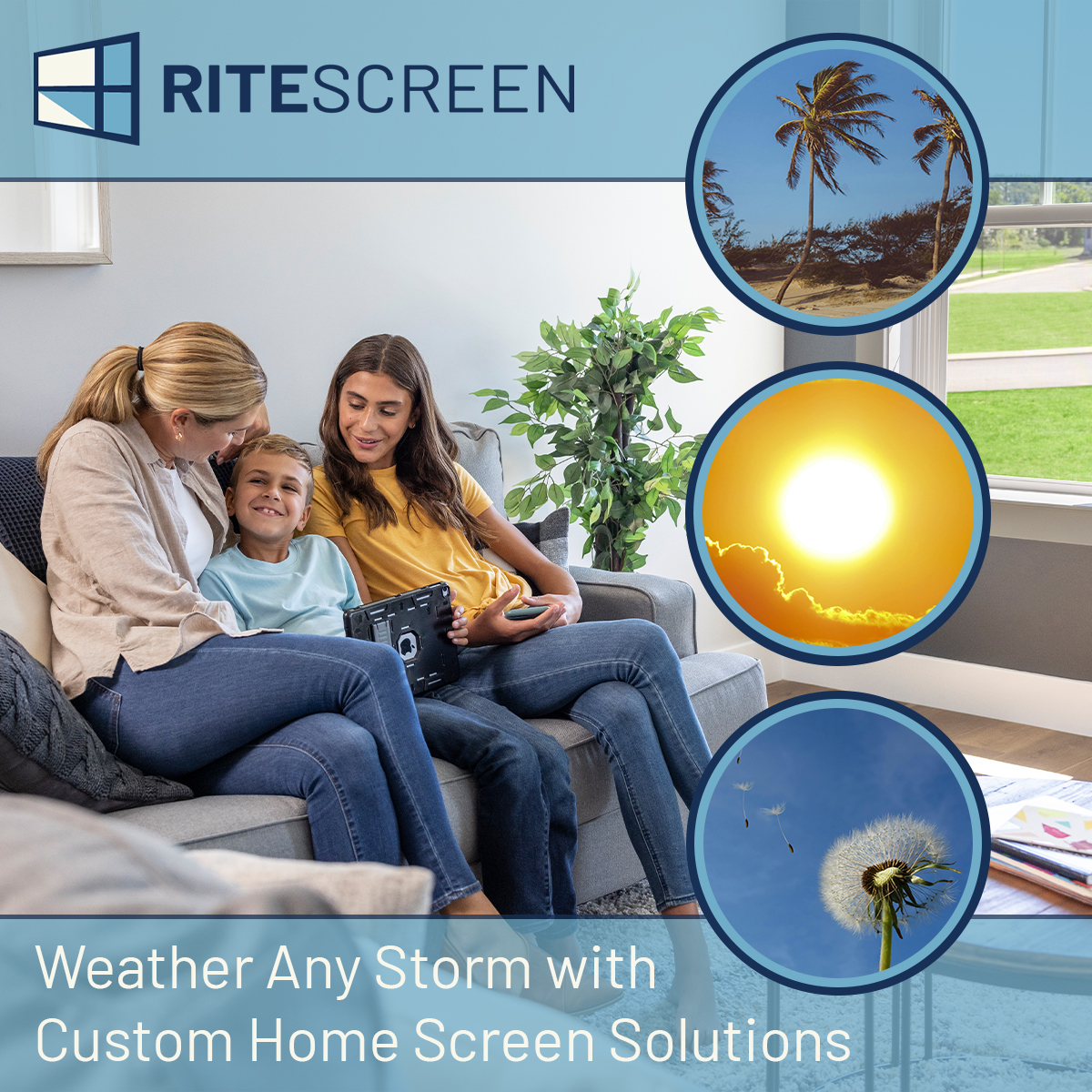
Window screens are often overlooked (or looked through) when homeowners plan how to best weatherproof their homes, but these humble fixtures pack a powerful punch in protecting your home against the elements. From keeping out debris during storms to enhancing energy efficiency, window screens offer a range of benefits that go beyond simply keeping insects at bay.
Custom window screen replacements can ensure the vulnerable entryways in your home are sealed against the tiniest intruders. They can also optimize those openings to better protect against allergens or clarify your views.
Explore how investing in quality window screens can help safeguard your home against various weather conditions and optimize your home for year-round comfort.
Protection from Debris and Pests During Storms
 Storms can bring strong winds that carry debris. This debris can easily damage your windows and even break them. Window screens act as a first line of defense, reducing the impact of flying debris. They provide a buffer that helps to slow down and catch leaves, twigs, and other small objects carried by the wind. This protects the glass from scratches and potential breakage this debris often causes. It also keeps window frames and seals from getting damaged. This means homeowners no longer have to worry about the integrity of their window systems throughout every season.
Storms can bring strong winds that carry debris. This debris can easily damage your windows and even break them. Window screens act as a first line of defense, reducing the impact of flying debris. They provide a buffer that helps to slow down and catch leaves, twigs, and other small objects carried by the wind. This protects the glass from scratches and potential breakage this debris often causes. It also keeps window frames and seals from getting damaged. This means homeowners no longer have to worry about the integrity of their window systems throughout every season.

Moreover, storms often drive insects and small pests to seek shelter, and open windows are popular entry points. Ever leave your windows open to hear the rain? Without window screens, you can almost guarantee bugs and water are entering the home. That means bugs, mold, mildew, rust, and all kinds of gross stuff you can’t even see!
High-quality window screens prevent these uninvited guests from entering your home, allowing you to maintain ventilation without compromising comfort or health. Modern, rigid window screens are so durable that they can withstand strong gusts without tearing or detaching from the frame, providing continuous protection throughout the storm. If seeking a weatherproof screen solution in all conditions, aluminum and fiberglass offer optimized reliability and versatility!
Weatherproof Against UV Exposure and Sun Damage
 Towards the end of spring, the weather seems to switch between nonstop rain and relentless sun. The rain may pose the more obvious threat, but UV rays from the sun can gradually cause significant damage to the interior of your home. Prolonged exposure to UV light can fade and degrade the materials found in curtains, carpets, furniture, and even wooden floors. This type of damage not only affects the aesthetic appeal of your home but also your property value. It can also lead to costly replacements and repairs that were largely unnecessary.
Towards the end of spring, the weather seems to switch between nonstop rain and relentless sun. The rain may pose the more obvious threat, but UV rays from the sun can gradually cause significant damage to the interior of your home. Prolonged exposure to UV light can fade and degrade the materials found in curtains, carpets, furniture, and even wooden floors. This type of damage not only affects the aesthetic appeal of your home but also your property value. It can also lead to costly replacements and repairs that were largely unnecessary.
Window screens, especially those designed with UV protection in mind, can block a substantial amount of these rays. By filtering out UV light, window screens help preserve the color and integrity of your interior furnishings. This is particularly important for homes with large windows or sunrooms where exposure to sunlight is more intense. Additionally, by reducing the amount of UV light that enters your home, window screens can simultaneously provide greater control of the lighting in your living spaces and foster a more comfortable and safer living environment.
Perhaps the most famous UV-protective screen is Phifer’s SunScreen®, which claims to block 70% of the sun’s heat and harmful UV rays. SunScreen® is an increasingly popular insect screen option for custom window screens, especially with light-sensitive homeowners or homeowners with health concerns related to their skin. Need to weatherproof against the sun more than anything else? SunScreen (AKA SolarScreen) is the choice for you!
Rain & Winter Weather Protection
Modern window screens are designed with weather-resistant materials that allow air to pass through while repelling water. This feature is particularly beneficial during light to moderate rain showers. Traditional window designs often require windows to be closed during rain to prevent water from entering the home. 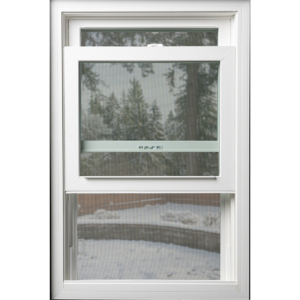 However, some window options allow the window to stay open while providing cover – see the RiteScreen CA3 Awning Window Screen for an example. This window provides constant airflow, so the screen must be durable through all conditions. Most leading window screens are made with fiberglass mesh and an aluminum frame.
However, some window options allow the window to stay open while providing cover – see the RiteScreen CA3 Awning Window Screen for an example. This window provides constant airflow, so the screen must be durable through all conditions. Most leading window screens are made with fiberglass mesh and an aluminum frame.
Window screens can be made from other more advanced materials as well, such as tightly woven synthetic fibers coated with water-resistant treatments. The weave and coating work together to prevent rain droplets from penetrating the screen without impeding ventilation. This means that even during light rain, you can avoid the stuffiness that often comes from having to keep your home closed. It’s an excellent way to maintain indoor air quality and enjoy the sound and scent of rain without the associated moisture problems inside your home.
The ability to weatherproof your home through constant rain is a bare minimum for window screens. More impressively, aluminum and durable mesh options (e.g. PetScreen®, AllergyGuard®, etc.) can more effectively resist puncturing or denting from hail, sleet, and other forms of winter weather. Once the screen is installed, most homeowners never remove it. In these instances, a more durable mesh option is likely the optimal screen solution.
Spring Weatherproofing for Easy Allergy Relief
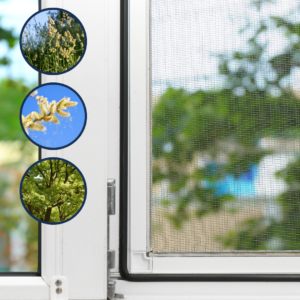 Springtime often brings a surge in pollen, which can be a nightmare for those with allergies. Pollen especially can enter your home through open windows, exacerbating allergy symptoms such as sneezing, itchy eyes, and congestion. Your home should be a sanctuary from these conditions! High-quality window screens can act as a barrier to pollen, significantly reducing the amount that enters your home. Screens with a fine mesh are particularly effective at trapping pollen and other airborne allergens, allowing you to enjoy fresh air without suffering from seasonal allergies.
Springtime often brings a surge in pollen, which can be a nightmare for those with allergies. Pollen especially can enter your home through open windows, exacerbating allergy symptoms such as sneezing, itchy eyes, and congestion. Your home should be a sanctuary from these conditions! High-quality window screens can act as a barrier to pollen, significantly reducing the amount that enters your home. Screens with a fine mesh are particularly effective at trapping pollen and other airborne allergens, allowing you to enjoy fresh air without suffering from seasonal allergies.
By keeping windows open and screens in place, you can maintain good ventilation while minimizing the intrusion of allergens. This is especially beneficial in bedrooms and living areas where you spend a lot of time. Additionally, this can help improve indoor air quality, making your home a more comfortable and healthier environment during allergy season.
But if that’s not enough, you can always upgrade your window screens to include AllergyGuard®. This insect screen is one of the most durable meshes on the market and blocks most allergens (including over 99% of pollen)!
Choosing the Right Window Screens to Weatherproof Your Home
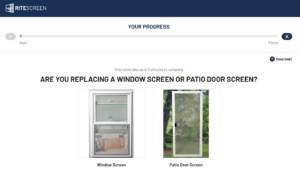
After covering all the threats facing your home, you may feel overwhelmed by everything you have to consider. When selecting window screens to weatherproof your home, consider factors such as the material, mesh size, and frame durability.
Aluminum screens offer an optimized blend of robust protection and stylish longevity, while fiberglass screens are more affordable and easier to install. For maximum weather protection, opt for screens with a fine mesh that can block small debris and insects without compromising ventilation.
For tips on which mesh is right for you, check out the RiteScreen blog: What Type of Window Screen Mesh Should You Use? Or chat with the RiteScreen team directly to better understand the unique screen needs of your home!



